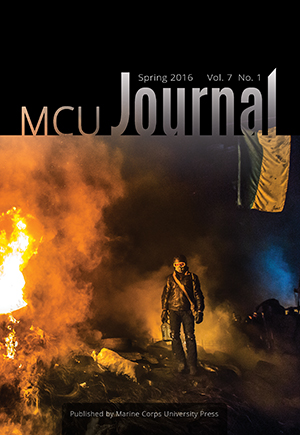 MCU Journal, vol. 7, no. 1
MCU Journal, vol. 7, no. 1
Spring 2016
pdf
ePUB
From the Editors
Identity, Attribution, and the Challenge of Targeting in the Cyberdomain
Col Glenn Voelz, USA, and Sarah Soliman
MCUJ vol. 7, no. 1
https://doi.org/10.21140/mcuj.2016070101
Abstract: The cyberdomain has become “key terrain” of irregular warfare with state and nonstate actors leveraging social media and other digital tools for command and control, intelligence gathering, training, recruiting, and propaganda. Department of Defense cyberstrategy highlights the urgent need for improved cyber situational awareness to reduce anonymity in cyberspace. This requires new technologies, doctrine, and analytical approaches for identifying and targeting adversaries operating in a digital landscape. This article examines identity-based targeting approaches developed during recent conflicts as a possible starting point for this effort.
Keywords: cyberdomain, social media, targeting, identity intelligence, attribution, gray zone conflicts, hybrid warfare, Islamic State, terrorism, biometrics, network analysis, big data, activity-based intelligence, high-value individuals
ABOUT THE AUTHORS
Col Glenn Voelz, USA, is the senior intelligence analyst on the International Military Staff at NATO Headquarters. He was previously the U.S. Army War College fellow in the Massachusetts Institute of Technology’s Security Studies Program and at MIT’s Lincoln Laboratory. He is a graduate of West Point and holds advanced degrees from the University of Virginia and the National Intelligence University. Sarah Soliman spent two years in Iraq and Afghanistan as a technician supporting Department of Defense biometrics, forensics, and sensitive site exploitation, including time with U.S. Special Operations Command. She now studies emerging technology trends as a project associate at Rand in Washington, DC, and is pursuing a PhD through King’s College London Department of War Studies.
Russia’s Ambiguous Warfare and Implications for the U.S. Marine Corps
Mary Ellen Connell and Ryan Evans
MCUJ vol. 7, no. 1
https://doi.org/10.21140/mcuj.2016070102
Abstract: The Russian Federation used ambiguous warfare strategies to annex Crimea in 2014 and propagate Ukrainian instability. Rapidly generated, highly trained, and well-disciplined Russian forces on the ground in Ukraine unofficially coordinated with pro-Russian separatists to conduct psychological operations, intimidation, and bribery among the population to undermine nationalist resistance. Illustrating warfare’s expanding reach, these activities obscure the factors that the North Atlantic Treaty Organization traditionally uses to identify the need for the cooperative defense of a member nation. This summary of a CNA-organized meeting of experts captures these topics and their implications on the U.S. government’s current warfighting strategy.
Keywords: Gerasimov Doctrine, Russia, Ukraine, Crimea, Donbass, Baltic states, Spetsnaz, U.S. Marine Corps, maskirovka, ambiguous warfare, warfighting strategy, unmanned aerial vehicle, drone use
ABOUT THE AUTHORS
Mary Ellen Connell is a research scientist with CNA’s Center for Strategic Studies and a graduate of the National War College. A former counselor in the U.S. Senior Foreign Service, Connell served at U.S. embassies in Africa and Europe and the U.S. mission to NATO. Ryan Evans is a research analyst at CNA’s Center for Strategic Studies and the founder and editor in chief of War on the Rocks.
The Dragon’s Pearls:
China’s Road to Hegemony in the Indian Ocean
Capt David L. O. Hayward, Australian AR (Ret)
MCUJ vol. 7, no. 1
https://doi.org/10.21140/mcuj.2016070103
Abstract: In this article, the author argues that China is moving toward hegemony in the Indian Ocean Region to secure its ability to obtain the gas and oil supplies it needs for commercial development and possibly for national security and military purposes. He argues further that the China–Pakistan Economic Corridor projects and ideas, such as the One Belt, One Road and Maritime Silk Road initiatives, among others, are benign sounding ways to obscure China’s more complex desires, previously referred to as a String of Pearls by Department of Defense analysts.
Keywords: China, waishi, maritime strategy, String of Pearls, Maritime Silk Road, China–Pakistan Economic Corridor, foreign direct investment, logistics, supply chain, oil, crude oil, gas, fossil fuel reserves, consumer market, global economy, Chinese shipping lane, Chinese port, Indian Ocean Region, China’s Near Seas, People’s Republic of China, People’s Liberation Army Navy, Association of Southeast Asian Nations, Strait of Malacca, Malacca dilemma
ABOUT THE AUTHOR
Capt David L. O. Hayward, Australian Army Reserve (Ret), is a freelance defense analyst. His defense papers have been posted to 16 websites worldwide. Hayward is an associate at Future Directions International (FDI), a member of the Royal United Service Institute Queensland, and an intern at the Intelligence Community in Washington, DC.
Can Refugees Be National Security Assets?
Afghan American Contributions to U.S. National Defense since 1978
John Baden
MCUJ vol. 7, no. 1
https://doi.org/10.21140/mcuj.2016070104
Abstract: This article examines historical contributions of U.S. Afghans to U.S. foreign policy, especially since 11 September 2001. Since then, U.S. Afghans have served as interpreters, analysts, language instructors, and cultural advisors for the U.S. government and military. Most Afghans came to the United States since 1978, after war broke out in Afghanistan and created one of the world’s worst refugee crises. This history suggests that if done properly, refugee policy can be both humane and add to the country’s defense.
Keywords: Afghan Americans, Afghan immigrants, Afghan refugees, refugees, refugee crisis, special immigrant visas, SIV, U.S. interpreters, Marine interpreters, Cold War, War in Afghanistan, U.S. Marine Corps, immigrant history, Afghan American studies, Afghan American history
ABOUT THE AUTHOR
John Baden, a history doctoral candidate at Case Western Reserve University, is currently writing a dissertation that examines immigrant communities’ roles in U.S. foreign relations. It focuses on Afghans in the United States and their relations and interactions with Afghanistan since 1978.
REVIEW ESSAY
BOOK REVIEWS